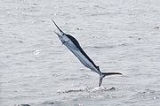
White marlin
Encyclopedia
White Marlin are large, elongated fish with a large upper jaw that forms a spear which is round in cross-section. They are dark blue to chocolate-brown in color. Although generally considered to be a rare and solitary species relative to other similar fish, white marlin occur in small groups consisting of several individuals.
. The White Marlin's preferred habitat is deep blue water
over 100m (330 feet). The species usually migrates to high latitude
s in the warm season. They reproduce while in the subtropics
; spawning
in early summer in deep, oceanic waters. Prey items include a variety of fish, crustacean
s, and cephalopod
s.
in international longline fisheries. However, the International Commission for the Conservation of Atlantic Tunas (ICCAT) reports indicate that recent international management recommendations have started stabilizing the stock biomass.
In 2010, Greenpeace
International has added the white marlin to its seafood red list. "The Greenpeace International seafood red list is a list of fish that are commonly sold in supermarkets around the world, and which have a very high risk of being sourced from unsustainable fisheries."
Ecology
Average size is 45 to 65 lbs (20–30 kg) roughly the size of an Indo-Pacific sailfish, with females reaching relatively larger sizesSexual dimorphism
Sexual dimorphism is a phenotypic difference between males and females of the same species. Examples of such differences include differences in morphology, ornamentation, and behavior.-Examples:-Ornamentation / coloration:...
. The White Marlin's preferred habitat is deep blue water
Photic zone
The photic zone or euphotic zone is the depth of the water in a lake or ocean that is exposed to sufficient sunlight for photosynthesis to occur...
over 100m (330 feet). The species usually migrates to high latitude
Latitude
In geography, the latitude of a location on the Earth is the angular distance of that location south or north of the Equator. The latitude is an angle, and is usually measured in degrees . The equator has a latitude of 0°, the North pole has a latitude of 90° north , and the South pole has a...
s in the warm season. They reproduce while in the subtropics
Subtropics
The subtropics are the geographical and climatical zone of the Earth immediately north and south of the tropical zone, which is bounded by the Tropic of Cancer and the Tropic of Capricorn, at latitudes 23.5°N and 23.5°S...
; spawning
Spawn (biology)
Spawn refers to the eggs and sperm released or deposited, usually into water, by aquatic animals. As a verb, spawn refers to the process of releasing the eggs and sperm, also called spawning...
in early summer in deep, oceanic waters. Prey items include a variety of fish, crustacean
Crustacean
Crustaceans form a very large group of arthropods, usually treated as a subphylum, which includes such familiar animals as crabs, lobsters, crayfish, shrimp, krill and barnacles. The 50,000 described species range in size from Stygotantulus stocki at , to the Japanese spider crab with a leg span...
s, and cephalopod
Cephalopod
A cephalopod is any member of the molluscan class Cephalopoda . These exclusively marine animals are characterized by bilateral body symmetry, a prominent head, and a set of arms or tentacles modified from the primitive molluscan foot...
s.
Conservation
In 2006, White marlin are mostly caught as bycatchBycatch
The term “bycatch” is usually used for fish caught unintentionally in a fishery while intending to catch other fish. It may however also indicate untargeted catch in other forms of animal harvesting or collecting...
in international longline fisheries. However, the International Commission for the Conservation of Atlantic Tunas (ICCAT) reports indicate that recent international management recommendations have started stabilizing the stock biomass.
In 2010, Greenpeace
Greenpeace
Greenpeace is a non-governmental environmental organization with offices in over forty countries and with an international coordinating body in Amsterdam, The Netherlands...
International has added the white marlin to its seafood red list. "The Greenpeace International seafood red list is a list of fish that are commonly sold in supermarkets around the world, and which have a very high risk of being sourced from unsustainable fisheries."

